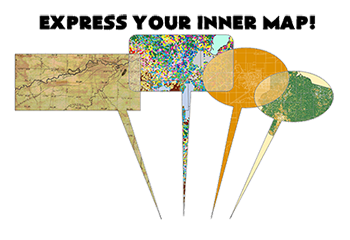As reported in an earlier Mapping Bulletin article, a team at UW-Madison is inviting the public to participate in a series of community forums at locations around the state to discuss the Wisconsin Historic Landscape database. The goal of these forums is to determine the broader user community for the database, and the kinds of needs, products, and usability needed to facilitate further use of this invaluable resource. The locations and dates for these forums have now been set.
Background
The Wisconsin Historic Landscape database was developed by the UW-Madison Forest Ecosystem and Landscape Ecology Lab from the notes of General Land Office (GLO) surveyors. From the 1830s to the 1860s, government surveyors walked the land that would become the State of Wisconsin, systematically establishing survey markers and documenting “witness” or bearing trees that would help identify boundaries. They recorded nearly a half million trees across the state – and indicated the species, size (diameter in inches) and distance from the survey marker.
The notebooks used by the surveyors were scanned and are now archived within the UW Digital Collections Center. With the assistance of many team members over the years, David Mladenoff – Director of the Forest Ecosystem and Landscape Ecology Lab and Beers-Bascom Professor in Conservation in the Department of Forest and Wildlife Ecology at UW-Madison – computerized all of the tree data and the notes recorded within these notebooks.
Mladenoff has used the database to reconstruct the presettlement vegetation of Wisconsin. Some of these maps and background about the survey itself were highlighted in a publication by the Wisconsin Department of Natural Resources. The data have been shared so that others could create vegetation maps for smaller regions and counties as well.
Project Goal
The goal of the Wisconsin Historic Landscape Community Forum Project is to gain a better understanding of the user community and identify users’ needs and goals, so that the database can be made more accessible and useful to interested citizens, community organizations, individual landowners, government agencies, land information professionals, educators, and others.
Community involvement is the essence of the project. The project team will hold a series of community forums throughout the state to provide a way for the community to provide feedback and share thoughts and ideas. The dates and locations of the forums are as follows:
Forum #1. Stevens Point, June 30, 2015, 9-11:30 am
Forum #2. Ashland, July 15, 2015, 9-11:30 am
Forum #3. Milwaukee area, Aug 4, 2015, 9-11:30 am
Forum #4. Madison, Sept 23, 2015, 9-11:30 am
All forums are free and open to the public. Interested parties are also welcome to contact a project team member directly to discuss their thoughts and ideas. The project team will compile information from the forums and use it to design a system that better meets users needs.
Acknowledgements
The Wisconsin Historic Landscape Community Forum Project is funded by the Ira and Ineva Reilly Baldwin Wisconsin Idea Endowment, a competitive grant program designed to foster public engagement and advance the Wisconsin Idea – the principle that the University of Wisconsin should improve people’s lives beyond the classroom through teaching, research, outreach and public service.
Project partners are the UW-Madison Forest Ecosystem and Landscape Ecology Lab (within the Department of Forest and Wildlife Ecology at UW-Madison), the State Cartographer’s Office (a division of the Department of Geography at UW-Madison), and UW Digital Collections Center.

